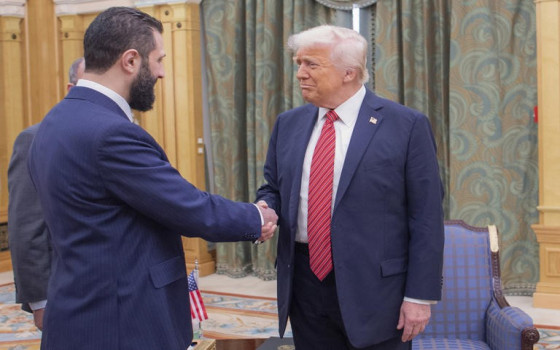
Syrian President: From Terror Lists to the White House – A Historic Meeting Brings Together Al-Sharaa and Trump Today

- Europe and Arabs
- Monday , 10 November 2025 10:17 AM GMT
Washington: Europe and the Arabs
The meeting between the Syrian interim president, Ahmed al-Sharaa, and US President Donald Trump at the White House on Monday is attracting considerable attention, as it is the day that will crown an exceptional year for the man who managed to escape international isolation and the stigma of 'terrorism', and become the first Syrian president to visit Washington since the country's independence in 1946, to walk on the red carpet in the most important decision-making center in the world, alongside Trump, the dealmaker and 'war-endorer' as he describes himself. According to a report by the European news network Euronews in Brussels, the meeting between the two leaders comes six months after their first meeting in Saudi Arabia, when the Republican president described the 42-year-old al-Sharaa as "handsome," just days after Washington announced that al-Sharaa, a former member of al-Qaeda, was no longer designated a "Specially Designated Global Terrorist."
This visit also comes after al-Sharaa addressed the United Nations General Assembly in New York last September, becoming the first Syrian president in decades to speak at the international organization.
Upon his arrival in Washington, al-Sharaa met with the Managing Director of the International Monetary Fund, Kristalina Georgieva, to discuss ways to support Syria, and also met with representatives of Syrian organizations.
Implications of the Visit
Michael Hanna, the US program director at the International Crisis Group, believes that al-Sharaa's visit to the White House "carries great symbolic weight for the new leader, who is taking another step in his remarkable transformation from a hardliner to a global statesman." Hanna told AFP that His reception in Washington is not merely a political opening, but also aims to limit the possibility of Iran and Russia regaining their strategic influence within Syria. Thus, the man once an enemy of the United States is now being celebrated as a potential ally.
What is expected from the meeting?
Security: Security is likely to top the agenda, as Washington is mediating talks between Syria and Israel regarding a potential security agreement. Reuters reported that the United States is planning to establish a military presence at an airbase near Damascus.
Syria is also expected to formally announce its joining the US-led international coalition against ISIS during the White House meeting.
Sanctions: Days before the meeting, Trump told reporters at the White House that "a lot of progress has been made on Syria," adding, "I think al-Sharaa is doing a very good job." It's a difficult region, and he's a strong man, and I got along well with him.” The White House occupant had announced, after meeting with al-Sharaa in Riyadh, in the presence of Saudi Crown Prince Mohammed bin Salman and Turkish President Recep Tayyip Erdoğan, that he would lift all sanctions imposed on Syria. However, the sanctions imposed on the regime of ousted President Bashar al-Assad, known as the “Caesar Act,” can only be lifted by a decision of Congress, and the ongoing government shutdown could pose an obstacle to this. Meanwhile, a debate is underway in Congress regarding the complete lifting of sanctions. Republican Representative Brian Mast, chairman of the House Foreign Affairs Committee, expressed reservations about a complete lifting, while Republican Senator Lindsey Graham – a close ally of Trump – called for linking it to a number of conditions, including guaranteeing the security and rights of religious and ethnic minorities, maintaining peaceful relations with countries in the region, including Israel, and removing foreign fighters from state and security institutions. These discussions come after waves of sectarian violence in Syria, during which hundreds of civilians from the Alawite and Druze sects were killed by Sunni militants. Government loyalists. Al-Sharaa promised to hold those responsible accountable, but minorities remain wary.
In this context, the organization "Save Persecuted Christians" sent a letter signed by one hundred American religious leaders to Trump, urging him to address what it described as "massacres of minorities" in Syria and to pressure al-Sharaa to open a humanitarian corridor from the Israeli-controlled Golan Heights to the predominantly Druze region of Suwaida in the south.
It is believed that lifting sanctions completely could encourage countries close to Syria to contribute to its reconstruction. The World Bank has estimated that this process will require more than $200 billion. However, Gulf states, most notably Qatar, remain hesitant due to the sanctions.
A Dramatic Transformation in al-Julani's Character
Beyond the political dimensions of the meeting, many analysts and the international press are focusing on al-Sharaa himself, whose dramatic trajectory mirrors that of his country.
The man who is meeting with Trump today at the White House had joined al-Qaeda in Iraq during the invasion. He was arrested in the United States in 2003 and spent years in a US prison before returning to Syria to join the insurgency against the Assad regime.
In 2013, the United States designated him a terrorist due to his ties to al-Qaeda. However, in 2016, he announced he was severing ties with the organization and consolidated his power in the northwest of the country, founding al-Nusra Front.
Today, Washington warmly welcomes him after lifting the $10 million reward for his capture or that of Abu Muhammad al-Julani. Last week, the UN Security Council removed sanctions imposed on him and his Interior Minister, Anas Khattab.












No Comments Found